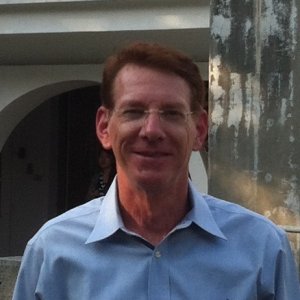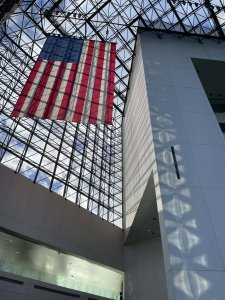Taiwan is a welcoming, multicultural environment offering wonderful opportunities to international scholars. I have known Taiwan for 30 years, having first come at age 28 to teach English for a summer at the Tainan YMCA, and returning a year later for Chinese language study at the Stanford Center at National Taiwan University. After earning my PhD in East Asian Studies from the University of British Columbia in 1990, I have made several more trips to Taiwan: as a research scholar at Academia Sinica in the summer of 1996, as a guest professor of history at National Chengkung University in the spring of 2012, and now as a Senior Fulbright Scholar at Tunghai University. Tunghai University is a highly regarded private university in central Taiwan, founded in 1955 by the United Board for Christian Higher Education in Asia. Its motto is “Sustainability on the Foundation of Liberal Arts.” In the course of my fruitful five months at Tunghai, I have dedicated myself to collaborative work between Trinity University and the International College at Tunghai University. I have contributed to the strong relationship between these two institutions and our two countries in three areas: service, teaching, and research.
Service
As one of my primary objectives, I began to develop a study abroad program at Tunghai, specifically targeting American students. Part of a Trinity University initiative to develop study abroad programs around the world, this program will start in fall of 2015. It will feature Chinese language instruction at the Tunghai Chinese Language Center and English-taught courses in General Education and International Business. As part of my efforts, I have created materials that highlight the unique opportunities offered by studying in Taiwan:
- One of the most multi-cultural nations in East Asia (with rich cultural diversity and historical impacts: Aboriginal, Taiwanese, Chinese, Japanese, and Western)
- A gateway to China:
- A treasury of traditional Chinese culture and values
- Mandarin Chinese with reading and writing of traditional characters
- Over 20% of GDP invested in China, leading to opportunities for internships or further study across the Strait
- Friendly, warm people
- Clean air and a beautiful natural environment (Tunghai University is the “most beautiful” university campus in Taiwan with architecture designed by I.M. Pei and extensive green spaces)
- A vibrant multi-party democracy with no restrictions on personal freedoms (no web censorship and no limits to political, artistic, or personal expression)
- US-friendly feelings and policies
The Trinity University administration has encouraged me to develop a program at Tunghai in cooperation with the Associated Colleges of the South. While at Tunghai, I have served as a curricular consultant for the newly established International College. The International College features English immersion (all courses are taught in English, and student work is submitted in English), a concentration in International Business Administration, and a liberal arts foundation. In particular, I have designed a “Global Leadership Honors Program” with 28 hours of coursework in the liberal arts:
- GL 1: Personal Identity in Historical Perspective
- GL 2: Art History and Art Appreciation
- GL 3: Political Conflicts and Opportunities: Cross-Straits Relations
- GL 4: Sustainability Studies: Green Technology and Public Policy
- GL 5: Global Leadership in Business and Management
- GL 6: Effective Communication Skills in English
- GL 7: Effective Communication Skills in Chinese
This design began this past fall, and I was the first instructor for GL 1.
Teaching
I taught three courses at Tunghai this semester: Asian Religions (18 students), Happiness (64 students), and Personal Identity in Historical Perspective (48 students). I taught using a combination of lectures, discussions, and student presentations. The most rewarding aspect of my teaching experience was with the student presentations based on my lectures. For example, in “Personal Identity in Historical Perspective,” I presented a series of six two-hour lectures centered on the question, “Is Taiwan Chinese?”
- Lecture 1: Personal Identity: Historical, Cultural, Political, and Social Factors
- Lecture 2: Aboriginal Origins
- Lecture 3: European and Chinese Colonization: 17th to 19th centuries
- Lecture 4: The Japanese Colonial Period
- Lecture 5: Taiwan under Martial Law
- Lecture 6: Democratization under Three Presidents
These lectures were accompanied with PowerPoint presentations. I provided the students with lecture outlines and tested them on their notes.
Then, students composed two essays in English and made individual 10-minute oral presentations to the class. The first essay was entitled “Is Taiwan Chinese? My Personal View,” and the second (with presentation), “Is Taiwan Chinese? My Family History.” For this presentation, students showed photos and maps on PowerPoint slides and shared information about their place of birth along with that of their parents and four grandparents. They were required to interview their parents on their experiences and opinions relating to identity issues. Since most students’ parents grew up during the period of Martial Law, their experiences were quite different from those of their children. I also required my students to interview or speculate on the self-identification of their grandparents. Students found this assignment an extremely fulfilling exercise: they learned how their own experiences have differed from those of earlier generations, and they learned how to express their self-identity in English.
In “Asian Religions,” field visits and PowerPoint-assisted presentations were also the culminating educational experience of the course. The student presentations entailed a field visit to a religious site. The class presentations, conducted in English or Chinese, followed this format:
- What is the temple? What religion?
- Where is the temple? (Show it on a map)
- What is the history of the temple?
- -Was it always located here?
- -When was it founded, built, or rebuilt?
- -Who were the founders or first members?
- Is the temple well-known? Who comes?
- Are there special days of the year or special activities?
- Tell three stories about the temple.
- Who did you speak with? What is their role at the temple? What did you read?
The students gave stimulating, well-executed presentations (many including both images and videos) on the following sites:
- Church of God/Taichung
- Intl Full Gospel Fellowship/Taichung
- Lu Dongbin Temple (善息寺)/Tucheng (土城)
- Luce Memorial Chapel/Tunghai University
- Ren-hai Temple (仁海宮)/Taoyuan
- Puji Temple (普濟寺)/Taichung
- Tudigong Temple (萬善堂)/Taichung
- Tianhougong (天后宮)/Lukang (鹿港)
- Zhenlonggong (鎮瀾宮)/Dajia (大甲)
- Xuantian Temple (玄天上帝廟)/Tainan
- Xingtiangong (行天宮)/Taipei
- Matsu Temple (媽祖廟)/Tainan
- Matsu Temple (媽祖廟)/Taichung
- The Church in Taichung/Taichung
- Good Shepherd Church/Taichung
- Fuxinggong (福興宮)/Taichung
- Pan Ding Presbyterian Church (磐頂教會)/Taichung
In my “Happiness” class, students read the World Happiness Report published by the United Nations Sustainable Development Solutions Network, and they completed several surveys and activities developed by several leading universities and non-profit organizations:
- Prof. Martin Seligman’s Positive Psychology Center at the University of Pennsylvania (Authentic Happiness website)
- The Greater Good Science Center at the University of California at Berkeley (Robert Emmons’ exercises on Gratitude)
- Action for Happiness “10 keys for happier living” developed in 2010 by Richard Layard, Geoff Mulgan and Anthony Seldon (London)
Students completed several exercises in English or Chinese:
- What is the relationship between happiness and physical health?
- What is the relationship between happiness and mental health?
- List 20 objective benefits of happiness
- Translate 50 objective benefits of happiness into Chinese
- What do the Aristotelian, Catholic, and Buddhist traditions teach about happiness?
- List 20 behaviors that have been demonstrated to produce happiness
- Keep a one-week log of happiness-related behaviors
- Answer ten comprehension questions on the Wikipedia article on “Happiness”
- What impact have recent food scandals had on Taiwan’s “gross national happiness?”
- Practice the “gratitude meditation” on a parent, a loved one, a neutral friend, a stranger whom you see regularly, someone you are angry with, and a group you distrust
- Complete the ten steps of the “Action for Happiness Keys for Happier Living”
- Keep a one-week log on “things I am grateful for”
- What are you grateful for in your closest friend?
Research
My research objectives and priorities changed over the course of the semester. My class preparation allowed me to develop a deeper understanding of the historical context of my two initial projects:
- Social analytical frameworks for research on temple festivals in Taiwan
- A history of Tunghai University
In addition, I developed a new research project on the question of Taiwan’s “Chinese” identity, focusing on student opinions and perspectives. The term project that I assigned to my students developed into my own research project, especially since students had done their own extensive interviews of parents and grandparents in preparation for their oral presentations and written summaries. I hope to publish or present a paper based on qualitative analysis focusing on three questions:
- How do college students in Taiwan today answer the question, “Is Taiwan Chinese?”
- How do their views differ from those of their parents and grandparents?
- How do their educational experiences differ from those of their parents and grandparents?
I will present these findings as well as a more general analysis of current higher education conditions in Taiwan at the annual meeting of AsiaNetwork (St. Louis) in April 2015.
General Thoughts
This has been a rich and fulfilling semester though extraordinarily busy. I wish I had more time to explore the area particularly the mountains near Taichung. I simply did not have the time. But my experience at Tunghai has been entirely positive, and I have made friends among the faculty and came to love my students. I sincerely believe in the mission of Fulbright and the Foundation for Scholarly Exchange in Taiwan: to make the world a friendlier place and to show the best side of American integrity, educational innovation, warmth, and consideration. I feel that I have been a good ambassador for Fulbright, the United States, and my home institution.
Randall Nadeau received his Master’s Degree in Religion from Princeton University (1980) and his Ph.D. in Asian Studies specializing in Chinese Religions from the University of British Columbia (1990), under the direction of Daniel Overmyer. He has published research on popular religious literature, deity cults, and folk religion in both China and Japan, as well as methodology in the study of religion, especially Buddhism and popular religious movements. Currently he is conducting research on religion and cultural identity, identity politics among youth in Hong Kong and Taiwan, and conceptions of human liberation in Asian religious traditions. Since 1990, Nadeau has been teaching at Trinity University in San Antonio, Texas, where he offers courses on Chinese and Japanese religions, the Buddhist tradition, popular religion in comparative perspective, gender and religion, and methodology in the study of religion. He has served on the board of the Society for the Study of Chinese Religion, and as chair of the Chinese Religions Group of the American Academy of Religion. He has also served as president of the Southwest Academy of Religion. At Trinity University, he has served as chair of the Department of Religion and of the University Curriculum Council. He has also taught at Lingnan University in Hong Kong and, as a Fulbright Senior Scholar, at Tunghai University in Taiwan.





